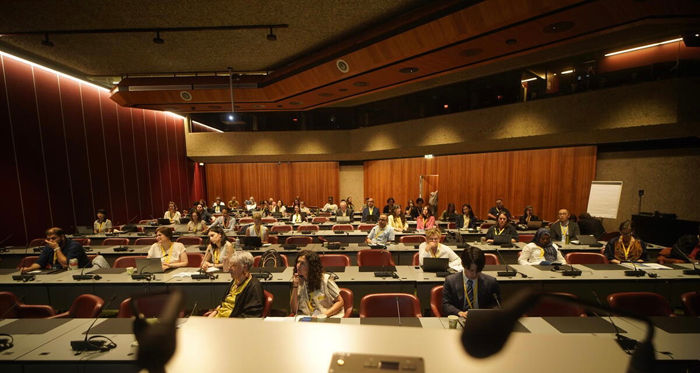JICUF President Paul Hastings Chairs a Session on Language Education at UNHCR's Annual Meeting in Geneva
- Aki Takada
- Jul 23
- 4 min read

JICUF President & CEO Paul Hastings was in Geneva from June 24 to 27 to attend the United Nations High Commissioner for Refugees (UNHCR) annual meeting, the Consultations on Resettlement and Complementary Pathways (CRCP). The CRCP is the most important multilateral forum for UNHCR, States, the private sector, academia, NGOs and refugees to discuss and develop innovative ways to find durable solutions for refugees.
In the leadup to this year’s CRCP, JICUF proposed a session on language education, which plays a critical role in the integration of refugees into host communities. The proposal was accepted, and Paul facilitated a discussion with the following panelists:
Madoka Shinozaki – Immigration Services Agency of Japan
Edward Fu – Duolingo
Ibrahim Sorani – Refugee student based in Slovenia
Rebecca Granato – Bard College
The session explored how language training not only promotes social integration, but also enhances employability, builds identity, and promotes the mental health of refugees. The discussion focused on both English and non-English contexts, with Japan and Slovenia as key case studies. Participants addressed the structural, pedagogical, and emotional challenges refugees face when acquiring new languages in pursuit of education and employment opportunities.
Below is a summary of the session based on a report by Suzan Husseini, doctoral student at Waseda University, who is also a member of the CRCP’s Refugee Advisory Group.

Shinozaki first presented an overview of Japan’s primary pathways for refugees and how language education is incorporated into them. For example, the government-led resettlement program provides pre-departure language orientation and 572 hours of Japanese instructions upon arrival. The language school program managed by JICUF’s partner organization Pathways Japan provides two years of language training, combined with part-time work.
She demonstrated how language education is built into each pathway as an essential tool for long-term integration, while also pointing out limitations such as the short duration of pre-departure language sessions (10–14 days), and the difficulties that older learners face in picking up Japanese. She also touched on the importance of employers to be involved in language education and ICT tools for self study, highlighting Japan’s progressive attempt at building multi-layered, sustainable support systems for language education.
Syrian student Ibrahim Sorani spoke of his journey from Syria to Turkey, Germany and Slovenia. He emphasized that language was not only a communication tool but also a means of reconstructing identity and reclaiming dignity. Alluding to his own experience teaching himself multiple languages and witnessing others do the same, he underscored the emotional toll of learning new languages in exile, especially for adults moving through multiple countries. He offered insights into how language can both liberate and limit refugee lives. He convincingly called for pedagogies that recognized the learner as a whole person, advocating for trauma-informed and motivational approaches rather than rigid testing metrics.
Fu brought a data-driven and global perspective, outlining how Duolingo has democratized access to English learning, especially for refugees. He shared that 90% of Duolingo users learn for free, and highlighted the company’s philanthropic commitment to make English testing accessible. Over $10 million in test fee waivers have been offered to displaced learners.
Fu illustrated how English opened doors to better employment opportunities worldwide. His view that traditional testing systems were expensive, inaccessible, and inflexible, especially for refugees, resonated with the audience. He stressed that language tests are not designed by those who need to take them and that there is an “empathy gap” in policy design. His proposal to integrate Duolingo into both refugee camps and elite education contexts demonstrated the potential for low-barrier tech solutions for global equity.
Granato spoke about Bard College’s Hubs for Connected Learning in Bangladesh and Kenya. The Hubs, co-led by Bard College and BRAC University under the Open Society University Network, are learner‑centered, technology‑enhanced bridge programs offering displaced and crisis‑affected communities contextualized higher‑education access, and teacher training. They currently operate in refugee camps in Kenya, Jordan and Bangladesh. Granato emphasized the different forms of pedagogy that are utilized for language learning within the Hubs, including play-based and storytelling-based pedagogies.

Key Takeaways:
Language as Identity & Belonging: Language learning supports psychological healing and social cohesion.
Need for Special Support for Older Learners: Adults over 30 face greater difficulty in language acquisition; night classes and family-sensitive models were proposed.
Technology as Enabler: Duolingo and online platforms offer low-cost, high-impact tools, especially where mobility or infrastructure is limited.
Contextualization of Education: Language education needs to be tailored to cultural, community, and work-based contexts and not just focus on grammatical exercises.
Mental Health & Motivation: Empowering learners and building confidence are as important as technical instruction.
Testing Reform: Traditional testing systems such as IELTS, TOEFL and Japanese Language Proficiency Test (JLPT) are costly, rigid, and often inaccessible for displaced learners. Better alternatives need to be developed.
Comment from Paul:
CRCP was a great opportunity for JICUF to showcase our work as an organization committed to expanding education pathways in Japan and around the world. JICUF and ICU have always emphasized the importance of multilingualism within our work, and it was a pleasure to lead the development and moderate a session on this in Geneva.




Comments